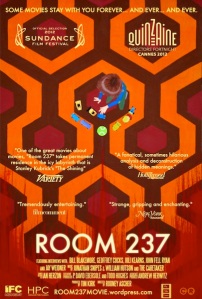Rodney Ascher’s analytical documentary about Stanley Kubrick’s The Shining is fascinating through and through.
The narrated ideas and theories provided by featured fans range from being thought-provoking to farfetched over stretches; but the impassion behind each deconstruction cannot be faked. Some of the points are built on flimsy foundations, but because these committed fans of Kubrick’s adaptation have put a lot of time and work into proving their meanings (including freeze frames, floor plans, and playing the film frontwards and backwards….at the same time), it’s hard to downright ridicule what’s being represented on screen.
The audience is free to disagree (and, trust me, you’ll disagree to at least one of these), but that’s what Room 237 is all about. The overall point to the film is to display how powerful film can be. The medium can ignite discussions and debates, it can take you down a rabbit hole, it can enthral and amaze audiences, it can also confuse, and one may be able to feel that resonance a few days after they see a particularly affecting piece of work.
A few of the narrators in Room 237 didn’t outright love Kubrick’s film at first. They knew something was “off” about the film though, which warranted re-watches in their eyes. Upon the next couple of screenings, they wondered why there were so many images of eagles and Native Americans hidden throughout the movie and why their focal points were zoned in on the decorative set and the confusing layout of the hotel rather than the action in a scene.
That constant feeling of “something isn’t right” alongside the disturbing behaviour in The Shining has led to opinions that the film could be saying something about the Holocaust, Native American genocide, or the concept that the Apollo moon landing was a hoax. There’s also something in there about sexually driven spirits and a Minotaur.
Room 237 is one of those movies where you forget to blink because you’re so involved with what’s being proposed. There are hangups though.
Although the doc is speedy, it has trouble flowing at feature length – structurally speaking. A lot of the opinions can stand on their own as interesting perspectives. When they’re compiled into a mishmash of different takes using repetitive footage, it’s an awful lot to take in with its abrupt transitions. It suggests to me that Room 237 would’ve worked better as a nine episode web series.
Also, I wish Ascher would’ve been more expressive with how each theory was told and shown. It’s good to know he’s wanting to take each opinion seriously, but there’s a clash when dramatic music is playing during someone’s rabid fixation with baking powder cans in the hotel’s kitchen. Talking about movies should be fun and cathartic and not feel like a university lecture.
Like the material the doc is based on, Room 237 definitely requires more than one view – whether you liked Ascher’s work or not. If those intricate subjects in the doc can find kernels of mystery in The Shining bringing them back for more, I can see a similar case playing out with this impressive labor of love.





Leave a comment